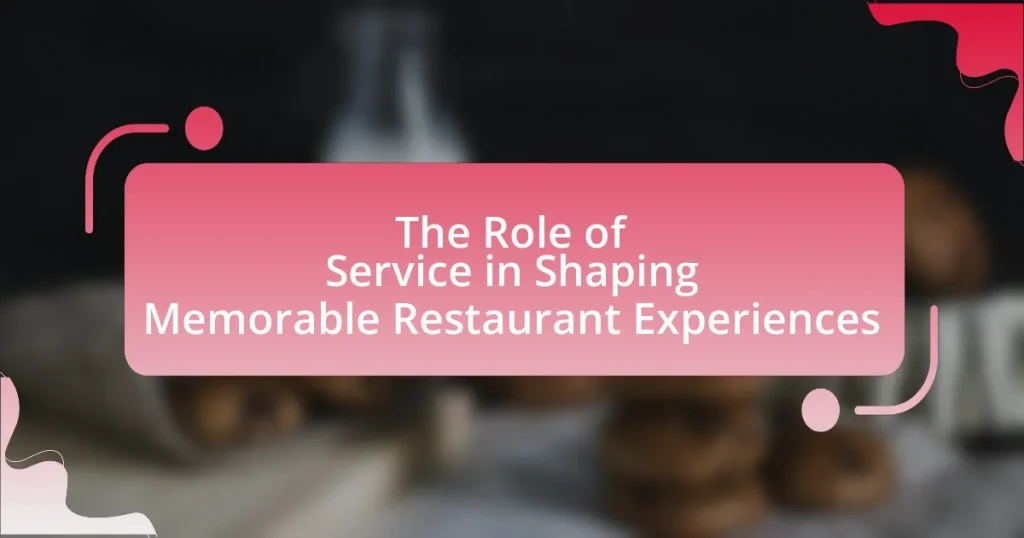The main entity of the article is the role of service in shaping memorable restaurant experiences. The article emphasizes that high-quality service is crucial for customer satisfaction and loyalty, with research indicating that 70% of customer loyalty is driven by service quality. It explores how service impacts customer perceptions, highlights specific aspects that contribute to memorable experiences, and discusses the importance of different service styles. Additionally, the article addresses the long-term benefits of exceptional service, the key elements of effective restaurant service, and the significance of staff training and communication in enhancing service quality. Overall, it underscores that outstanding service is essential for restaurant success and customer retention.

What is the Role of Service in Shaping Memorable Restaurant Experiences?
Service plays a crucial role in shaping memorable restaurant experiences by directly influencing customer satisfaction and emotional connection. High-quality service enhances the dining experience through attentive, personalized interactions, which can lead to positive reviews and repeat visits. Research indicates that 70% of customer loyalty is driven by the quality of service, highlighting its importance in the overall restaurant experience. Furthermore, effective service can create a welcoming atmosphere, making guests feel valued and appreciated, which significantly contributes to their overall enjoyment and likelihood of recommending the establishment to others.
How does service impact customer perceptions in restaurants?
Service significantly impacts customer perceptions in restaurants by influencing their overall dining experience and satisfaction levels. High-quality service, characterized by attentiveness, friendliness, and efficiency, leads to positive customer perceptions, enhancing their likelihood of returning and recommending the restaurant. Research indicates that 70% of customers cite service quality as a key factor in their dining experience, demonstrating its critical role in shaping perceptions. Furthermore, a study published in the Journal of Hospitality & Tourism Research found that exceptional service can elevate a customer’s perception of food quality and ambiance, ultimately affecting their overall evaluation of the restaurant.
What specific aspects of service contribute to a memorable experience?
Specific aspects of service that contribute to a memorable experience include personalized attention, promptness, and staff knowledge. Personalized attention, such as remembering a guest’s name or preferences, fosters a connection that enhances the dining experience. Prompt service ensures that customers feel valued and minimizes wait times, which is crucial in maintaining satisfaction. Staff knowledge about the menu and wine pairings allows for informed recommendations, enhancing the overall dining experience. Research by the Cornell University School of Hotel Administration indicates that attentive service significantly increases customer satisfaction and loyalty, demonstrating the importance of these service aspects in creating memorable experiences.
How do different service styles affect customer satisfaction?
Different service styles significantly affect customer satisfaction by influencing the overall dining experience. For instance, attentive service styles, such as fine dining, often lead to higher customer satisfaction due to personalized interactions and a focus on detail, which can enhance the perceived value of the meal. Conversely, casual service styles may prioritize speed and efficiency, appealing to customers seeking a quick meal but potentially sacrificing the depth of interaction. Research indicates that 70% of customers cite service quality as a key factor in their overall satisfaction, highlighting the importance of service style in shaping perceptions. Thus, the alignment of service style with customer expectations directly impacts satisfaction levels in restaurant settings.
Why is exceptional service crucial for restaurant success?
Exceptional service is crucial for restaurant success because it directly influences customer satisfaction and loyalty. High-quality service enhances the dining experience, leading to positive reviews and repeat business. According to a study by the National Restaurant Association, 70% of customers say that service quality is a key factor in their decision to return to a restaurant. Furthermore, exceptional service can differentiate a restaurant in a competitive market, as customers are more likely to recommend establishments that provide outstanding experiences.
What are the long-term benefits of providing outstanding service?
Providing outstanding service leads to increased customer loyalty, which is essential for long-term business success. Loyal customers are more likely to return, resulting in repeat business that can significantly boost revenue. According to a study by Bain & Company, increasing customer retention rates by just 5% can lead to an increase in profits of 25% to 95%. Additionally, exceptional service fosters positive word-of-mouth referrals, which can attract new customers without the need for costly marketing efforts. Research from the American Express Global Customer Service Barometer indicates that 70% of consumers are willing to spend more with a company that provides excellent service. Therefore, the long-term benefits of outstanding service include enhanced customer loyalty, increased profitability, and a broader customer base through referrals.
How does service quality influence customer loyalty?
Service quality significantly influences customer loyalty by directly impacting customer satisfaction and perceived value. High service quality leads to positive experiences, which fosters trust and emotional connections with the brand. According to a study published in the Journal of Service Research, a 1% increase in service quality can lead to a 2% increase in customer loyalty, demonstrating a clear correlation between the two. This relationship is further supported by the SERVQUAL model, which identifies dimensions of service quality—such as reliability, responsiveness, assurance, empathy, and tangibles—that contribute to customer retention. Thus, consistent delivery of high service quality not only enhances customer satisfaction but also cultivates long-term loyalty.

What are the key elements of effective restaurant service?
The key elements of effective restaurant service include attentiveness, communication, efficiency, and knowledge. Attentiveness ensures that staff are aware of customer needs and can respond promptly, enhancing the dining experience. Communication involves clear and friendly interactions between staff and customers, which fosters a welcoming atmosphere. Efficiency is critical in managing time and resources effectively, ensuring that orders are taken and served promptly, which is essential for customer satisfaction. Knowledge refers to the staff’s understanding of the menu, including ingredients and preparation methods, allowing them to make informed recommendations and answer customer inquiries accurately. These elements collectively contribute to a positive dining experience, as supported by studies indicating that attentive and knowledgeable service significantly increases customer satisfaction and loyalty in the restaurant industry.
How do staff training and development enhance service quality?
Staff training and development enhance service quality by equipping employees with the necessary skills and knowledge to perform their roles effectively. Well-trained staff can provide better customer service, leading to increased customer satisfaction and loyalty. For instance, a study by the American Society for Training and Development found that organizations with comprehensive training programs experience 218% higher income per employee than those without formalized training. This correlation indicates that investment in staff development directly impacts service quality, as trained employees are more competent in handling customer inquiries, resolving issues, and delivering a consistent service experience.
What skills are essential for restaurant staff to provide excellent service?
Essential skills for restaurant staff to provide excellent service include effective communication, attention to detail, and strong interpersonal skills. Effective communication ensures that staff can clearly convey menu information and respond to customer inquiries, which is crucial for a positive dining experience. Attention to detail allows staff to accurately take orders and meet specific customer requests, enhancing satisfaction. Strong interpersonal skills foster a welcoming atmosphere, enabling staff to build rapport with guests, which is vital for creating memorable experiences. These skills collectively contribute to high-quality service, as supported by industry standards that emphasize the importance of customer interaction in hospitality.
How can restaurants measure the effectiveness of their training programs?
Restaurants can measure the effectiveness of their training programs through employee performance metrics, customer feedback, and retention rates. Employee performance metrics can include assessments of service speed, accuracy of orders, and adherence to service protocols, which can be tracked through regular evaluations and mystery shopper reports. Customer feedback can be gathered through surveys and online reviews, providing insights into the dining experience and areas for improvement. Additionally, retention rates of trained employees can indicate the success of training programs, as higher retention often correlates with effective training and job satisfaction. These methods collectively provide a comprehensive view of training effectiveness, ensuring that service quality aligns with the goal of creating memorable restaurant experiences.
What role does communication play in restaurant service?
Communication is essential in restaurant service as it facilitates the exchange of information between staff and customers, ensuring a smooth dining experience. Effective communication helps servers accurately take orders, address customer inquiries, and manage expectations regarding food preparation times. According to a study published in the Journal of Hospitality Management, clear communication significantly enhances customer satisfaction and loyalty, as it reduces misunderstandings and fosters a welcoming atmosphere. Furthermore, non-verbal cues, such as body language and eye contact, also play a crucial role in creating a positive interaction, reinforcing the importance of communication in shaping memorable restaurant experiences.
How can effective communication improve the dining experience?
Effective communication enhances the dining experience by ensuring that guests receive accurate information about menu items, special requests, and service expectations. Clear dialogue between staff and patrons fosters a welcoming atmosphere, allowing diners to feel valued and understood. Research indicates that restaurants with high levels of staff communication report increased customer satisfaction, as effective interactions can lead to quicker service, reduced errors, and a more personalized experience. For instance, a study published in the Journal of Hospitality Management found that effective communication directly correlates with customer loyalty and repeat visits, highlighting its critical role in shaping memorable dining experiences.
What are common communication barriers in restaurant settings?
Common communication barriers in restaurant settings include language differences, noise levels, and unclear menu descriptions. Language differences can lead to misunderstandings between staff and customers, particularly in diverse areas where multiple languages are spoken. High noise levels in busy dining environments can hinder effective communication, making it difficult for staff to hear customer orders or for customers to ask questions. Additionally, unclear or overly complex menu descriptions can confuse patrons, resulting in incorrect orders or dissatisfaction. These barriers can negatively impact the overall dining experience and service quality.

How can restaurants create a memorable service experience?
Restaurants can create a memorable service experience by prioritizing personalized interactions with guests. This involves training staff to engage with customers in a friendly and attentive manner, remembering their preferences, and making recommendations based on individual tastes. Research indicates that personalized service can significantly enhance customer satisfaction, as evidenced by a study published in the Journal of Hospitality Marketing & Management, which found that personalized experiences lead to higher customer loyalty and repeat visits. Additionally, creating a welcoming atmosphere through thoughtful ambiance, such as lighting and music, complements the service experience, making it more enjoyable and memorable for diners.
What strategies can restaurants implement to personalize service?
Restaurants can implement several strategies to personalize service, including utilizing customer data, training staff for personalized interactions, and creating tailored dining experiences. By collecting and analyzing customer preferences through loyalty programs or reservation systems, restaurants can customize menus and recommendations, enhancing the dining experience. Training staff to recognize returning customers and remember their preferences fosters a welcoming atmosphere, making guests feel valued. Additionally, offering personalized touches, such as customized menus for special occasions or unique dining setups, can significantly enhance customer satisfaction and loyalty. These strategies are supported by research indicating that personalized service leads to increased customer retention and positive word-of-mouth, which are crucial for restaurant success.
How does understanding customer preferences enhance service delivery?
Understanding customer preferences enhances service delivery by enabling businesses to tailor their offerings to meet specific needs and desires. When restaurants analyze customer data, such as feedback and purchasing patterns, they can customize menus, improve service interactions, and create personalized experiences. For instance, a study by the National Restaurant Association found that 70% of consumers are more likely to return to a restaurant that offers personalized service, demonstrating that catering to individual preferences directly influences customer satisfaction and loyalty.
What role does ambiance play in shaping service experiences?
Ambiance significantly influences service experiences by creating an emotional backdrop that affects customer perceptions and satisfaction. A well-designed ambiance can enhance the overall dining experience, making customers feel more comfortable and engaged. Research indicates that elements such as lighting, music, and decor can evoke specific emotions and set expectations for service quality. For instance, a study published in the Journal of Consumer Research found that dim lighting and soft music can lead to longer dining times and increased spending, demonstrating how ambiance directly impacts customer behavior and service outcomes.
What are the challenges in maintaining high service standards?
Maintaining high service standards in restaurants faces several challenges, including staff training, consistency, and customer expectations. Staff training is crucial, as employees must be well-versed in service protocols and product knowledge; however, high turnover rates in the hospitality industry often hinder effective training. Consistency in service delivery is another challenge, as varying levels of employee experience and engagement can lead to discrepancies in customer experiences. Additionally, customer expectations are continually evolving, influenced by social media and online reviews, which can create pressure on restaurants to meet or exceed these standards consistently. According to a study by the National Restaurant Association, 70% of customers say that service quality is a key factor in their dining experience, highlighting the importance of addressing these challenges to maintain high service standards.
How can restaurants address staff turnover to ensure consistent service?
Restaurants can address staff turnover by implementing comprehensive training programs and fostering a positive work environment. Comprehensive training equips employees with the necessary skills and knowledge to perform their roles effectively, which can lead to increased job satisfaction and retention. A positive work environment, characterized by supportive management and recognition of employee contributions, enhances employee morale and loyalty. According to a study by the National Restaurant Association, restaurants that invest in employee training and development see a 20% reduction in turnover rates, demonstrating that these strategies are effective in ensuring consistent service.
What are effective ways to handle customer complaints related to service?
Effective ways to handle customer complaints related to service include actively listening to the customer, acknowledging their concerns, and providing a prompt resolution. Active listening ensures that customers feel heard and valued, which can de-escalate frustration. Acknowledging concerns demonstrates empathy and validates the customer’s feelings, fostering a positive interaction. Providing a prompt resolution, such as offering a refund or a replacement, can restore customer satisfaction and loyalty. Research indicates that 70% of customers who have a complaint resolved quickly are likely to return, highlighting the importance of effective complaint management in enhancing customer experiences in restaurants.
What best practices can restaurants adopt for exceptional service?
Restaurants can adopt several best practices for exceptional service, including training staff in effective communication, maintaining a clean and welcoming environment, and personalizing guest experiences. Effective communication ensures that staff can accurately take orders and address customer needs, which is crucial for satisfaction. A clean and welcoming environment enhances the overall dining experience, as studies show that cleanliness significantly impacts customer perceptions and repeat visits. Personalizing guest experiences, such as remembering regular customers’ preferences, fosters loyalty and creates memorable interactions, which are essential for building long-term relationships with patrons.
How can feedback systems improve service quality in restaurants?
Feedback systems can significantly enhance service quality in restaurants by providing actionable insights into customer experiences. These systems, such as surveys and online reviews, allow restaurants to gather real-time data on customer satisfaction and identify specific areas needing improvement. For instance, a study published in the Journal of Hospitality Management found that restaurants implementing feedback mechanisms saw a 20% increase in customer satisfaction scores after addressing issues highlighted by patrons. By analyzing this feedback, restaurant management can make informed decisions about staff training, menu adjustments, and service protocols, ultimately leading to a more positive dining experience and increased customer loyalty.
What are the most effective ways to train staff for service excellence?
The most effective ways to train staff for service excellence include comprehensive onboarding programs, ongoing training sessions, and role-playing scenarios. Comprehensive onboarding programs ensure that new employees understand the restaurant’s values, service standards, and customer expectations from the outset. Ongoing training sessions, which can include workshops and seminars, help reinforce these standards and introduce new techniques or menu items. Role-playing scenarios allow staff to practice real-life situations, enhancing their problem-solving skills and customer interaction abilities. Research indicates that organizations with structured training programs see a 24% higher customer satisfaction rate, demonstrating the direct impact of effective training on service excellence.















